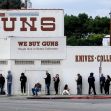California’s gun laws are among the strictest in the nation. In fact, according to a new ruling by the Ninth Circuit Court of Appeals, they are too strict. In a unanimous opinion, the appellate court said that the state “cannot ban truthful ads about lawful firearm use among adults and minors unless it can show that such an intrusion into the First Amendment will significantly further the state’s interest in curtailing unlawful and violent use of firearms by minors. The state could not, and the panel thus found the California law unconstitutional.
Writing for a three-judge panel, Circuit Judge Kenneth K. Lee began his opinion by narrowing the scope of Junior Sports Magazines, Inc. et. al v. Rob Bonta, Attorney General of California. He wrote, “This case is not about whether children can buy firearms. (They cannot under California law.) Nor is this case about whether minors can legally use firearms. (California allows minors under adult supervision to possess and use firearms for hunting, target practice, and other activities.) And this case is not about whether California has tools to combat the scourge of youth gun violence. (It does.) “
Instead, he explained, the case is about “whether California can ban a truthful ad about firearms used legally by adults and minors – just because the ad reasonably appears to be attractive to minors.” He gave examples of how the State’s gun laws go too far. Those that ban truthful ads about safety features, for example, do not “materially or directly” advance the State’s interest in reducing gun violence.
Thus, he concluded, “California cannot lean on gossamers of speculation to weave an evidence-free narrative that its law curbing the First Amendment ‘significantly’ decreases unlawful gun use among minors. The First Amendment demands more than good intentions and wishful thinking to warrant the government’s muzzling of speech.”
The California law at issue in this case is Section 22949.80 of its Business and Professional Code. It says that “A firearm industry member shall not advertise, market, or arrange for placement of an advertising or marketing communication offering or promoting any firearm-related product in a manner that is designed, intended, or reasonably appears to be attractive to minors.”
Lee said the law is simply too broad since California allows minors with adult supervision to hunt or shoot for sport. Knowing that many state residents approve of this activity, the Legislature chose to not outright ban guns but to “quell” youth’s interest in them by regulating their advertising through Assembly Bill 2571 (AB 2571). Enacted in 2022, this bill, which was signed by Governor Newsom on June 30, 2022, established the Business and Professional Code section which was later codified.
Junior Sports Magazines, the plaintiff/appellant, relies on advertising revenue to support its publication. It challenged AB 2571 under the First and Fourteenth Amendments, seeking an injunction. Presiding District Judge Christina A. Snyder of the U.S. District Court for the Central District of California, denied it because she thought the plaintiff was not “likely to succeed on the merits of its claims,” mainly because it regulated only commercial speech, and is thus reviewed under intermediate, not strict scrutiny.
Intermediate scrutiny is less rigorous and requires that a law furthers an important government interest by “means substantially related to that interest.” Junior Sports appealed to the Ninth Circuit, which agreed to review it to determine whether the District Court abused its discretion. Lee’s opinion quickly said that even under an intermediate scrutiny test, “California’s advertising restriction likely imposes an unconstitutional burden on protected speech.”
This determination was based on the Supreme Court’s precedent in Central Hudson Gas & Electric
Corp. v. Public Service Commission of New York. Using the High Court’s test, the Ninth Circuit found that the California law imposed “an unconstitutional burden on protected speech.” This is because the State failed to show that “truthful firearm-related advertising is sufficiently tailored to significantly advance the state’s goals of preventing gun violence and unlawful firearm possession among minors.”
“Because California fails to satisfy its burden to justify the proposed speech restriction, Junior Sports Magazines is likely to prevail on the merits of its First Amendment claim,” the opinion said. The magazine’s gun ads were not misleading and did not concern an unlawful activity. Thus, the California Attorney General failed to show that a government interest in banning the ads existed. Even though the state has a substantial interest in preventing gun violence, the “law does not directly advance that interest to a material degree,” Lee wrote.
The opinion emphasized that firearm use by minors who are under adult supervision is legal. Furthermore, “The state has provided no evidence—or even an anecdote—that minors are unlawfully using firearms because of advertisements for guns by the firearm industry. With no evidence connecting truthful and lawful firearm advertising to unlawful firearm possession or gun violence, California has not shown that § 22949.80 directly advances its interests to a material degree…And even if California could provide some evidence, it would have to show that its law restricting speech would “significantly” advance the state’s goals,” the opinion said.
It did neither. Rather, it imposes an “excessive burden on protected speech.” It is a “blanket restriction on firearm advertising” and is therefore unlikely to succeed on the merits. Lee concluded, “It is well established that the deprivation of constitutional rights ‘unquestionably constitutes irreparable injury... and, “the significant public interest in upholding First Amendment principles…is no different here.”
The District Court’s denial of the injunction was reversed and remanded for further proceedings that are consistent with the Ninth Circuit’s opinion. The Ninth Circuit held that the State “cannot ban truthful ads about lawful firearm use unless it can show that “such an intrusion into the First Amendment will significantly further the state’s interest in curtailing unlawful and violent use of firearms by minors.”
The opinion also pointed out that California has “many tools to address unlawful firearm use and violence among the state’s youth.” But banning truthful ads about their lawful use is not one of them. Hopefully, this opinion will prompt the use of more constitutional tools in the future.






